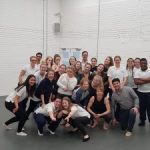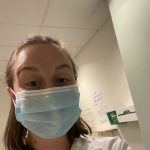 Produced by Guest blogger
Produced by Guest blogger
This is a guest blog by current student Emma Blackman, currently studying BSc (Hons) Physiotherapy.
COVID-19, what a rollercoaster. Working on the elderly care unit throughout this time has been heart wrenching and emotionally challenging at best. I have witnessed the absolute worst and the absolute best in a matter of months. The team-work I have seen within the NHS has been astounding, professionals coming together to not only support each other through, undoubtedly the toughest times of their careers, but also supporting their patients in ways they have never had to before.
As a 2nd year student physiotherapist I was unsure of what to expect on entering the wards on my first day, I was told that they would do the best they could to keep me away from patients testing positive for COVID-19. However, this quickly became apparent it was to be impossible, so I found myself on a ward full of patients who had tested positive for the virus. This was extremely difficult as you can imagine, with PPE provisions running low and emotions running high throughout; this environment was very different to anything I had experienced. I never once questioned the PPE I was given, I just got on and did the job that I am training to do. However, looking back I can see how strained the NHS was at this point with us wearing merely a surgical mask, plastic apron and gloves for treating any patients.
We were told that if we did not feel comfortable treating a patient in the PPE we were given, we could not treat them. However, this went against every moral a physiotherapist has and contradicts every reason that we wanted to come into this job: To help people.
I was able to help so many patients with not only improving their levels of mobility and teaching them methods to manage their secretion loads, so that they would be able to manage at home, but I was also acting as family to patients who needed it most and who were not allowed visits from their loved ones. This is what I found the most challenging throughout the pandemic. Patients who were ill and coming to the end of their lives and their families were unable to visit them to say their goodbyes. Examples of times I was able to spend an extra 15 minutes with someone reassuring them or getting their families on a video call so that they could have a chat.
However, with all the help I was able to give came all the people I could not help. I have seen more death in the past 3 months than I have in my entire life and my very short few years in training to become a physiotherapist. I found this extremely hard. Fortunately the NHS had implemented staff wellbeing centres in hospitals as well as support groups. This helped me a lot, but I didn’t go without the occasional cry in the equipment cupboard or sluice on days where it really got to me.
Alongside all of this was the fact that I was actually being marked for my clinical placement at the same time. Attending twice weekly study sessions virtually with lecturers to ensure we were working at the correct levels and achieving everything that we could at this time. This was essential and allowed us to apply factors such as clinical reasoning and treatment planning where we would be unable in clinical practice.
The amount of support I have received from Bournemouth University has been outstanding. Not only academically where they been supporting me to ensure that I achieve every one of my goals whilst working in such an unusual circumstance but also emotionally. Having one on one video calls with my tutor has enabled me to reflect and talk about my experiences and this has helped me through this time a lot.
Therefore, in conclusion, I have experienced something extremely rare and gained some invaluable skills in clinical practice along the way. However, I could not have done it without the support from both Bournemouth University and my colleagues at the NHS who have supported me endlessly throughout this time.
Emma Blackman,
BSc (Hons) Physiotherapy student.
 My trip to Helsinki
My trip to Helsinki Becoming a Physiotherapist during a Pandemic
Becoming a Physiotherapist during a Pandemic Adult nursing student Kayleigh highlights the positives among the negative press
Adult nursing student Kayleigh highlights the positives among the negative press My journey into Occupational Therapy course at BU
My journey into Occupational Therapy course at BU








